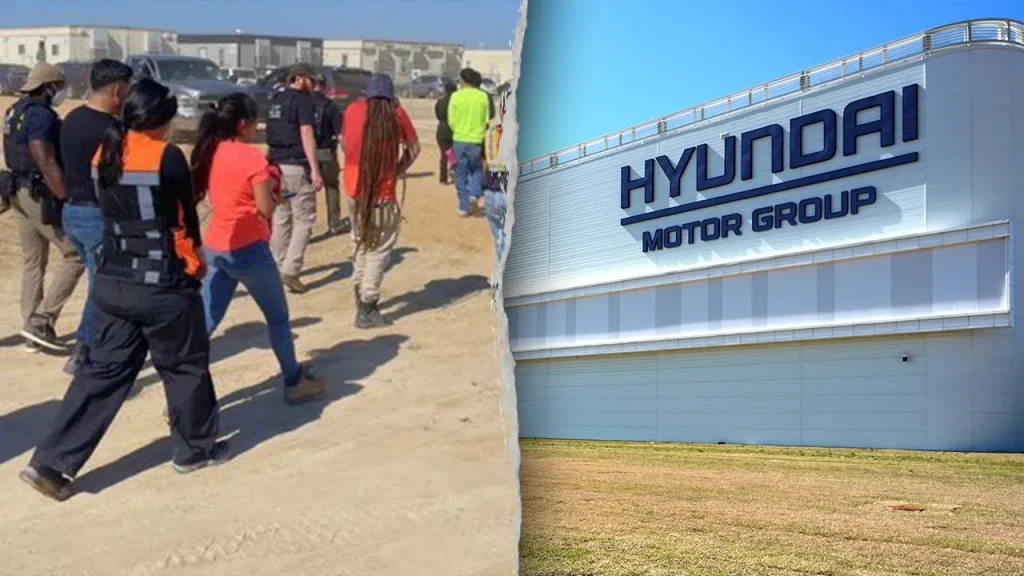Major Immigration Raid at Hyundai Battery Plant in Georgia Highlights Ongoing Enforcement Challenges
In a significant enforcement action that has sent ripples through diplomatic channels and the automotive industry, approximately 450 undocumented migrants were arrested Thursday during a sweeping raid at a Hyundai electric vehicle battery factory construction site in Georgia. The operation, conducted by multiple federal agencies including U.S. Immigration and Customs Enforcement (ICE) and Homeland Security Investigations (HSI), targeted the Hyundai-LG Energy Solution joint venture facility in Ellabell, about 20 miles from Savannah. This raid represents the largest workplace immigration enforcement action at a U.S. manufacturing site in recent years, continuing a pattern of high-profile workplace enforcement operations that have intensified in recent months. The dramatic scene unfolded as federal agents in tactical gear instructed workers in safety vests to cease all construction activities while announcing, “We’re Homeland Security. We have a search warrant for the whole site.”
The targeted facility is no ordinary construction project—it represents a massive $4.3 to $7.6 billion investment intended to supply batteries to Hyundai’s nearby Savannah electric vehicle manufacturing plant. The project stands as Georgia’s largest single industrial investment in the state’s history, spanning over 3,000 acres and symbolizing the growing shift toward electric vehicle production in the American automotive landscape. While construction at the battery site has been temporarily suspended following the raid, operations at the adjacent EV manufacturing facility reportedly continued without interruption. The timing of this enforcement action is particularly notable as the battery plant was scheduled to begin operations by the end of this year, according to LG Energy Solution, raising questions about potential delays to this timeline and broader implications for Hyundai’s electric vehicle production goals in the United States.
The raid has quickly escalated into an international matter, with South Korea’s foreign ministry expressing “concern and regret” over the enforcement action. Ministry spokesperson Lee Jae-woong emphasized that “our companies’ economic activities and our people’s rights should not be infringed unfairly in the US legal enforcement process,” highlighting the diplomatic tension created by the operation. South Korean officials responded rapidly, dispatching a counselor and embassy representatives to the site to address the situation. The raid comes at a particularly sensitive time in U.S.-South Korean economic relations, following a major trade deal struck in July that included commitments for approximately $350 billion worth of South Korean investments in the United States. This enforcement action against workers at a facility representing part of that investment has created an uncomfortable diplomatic situation between the two allies.
During the operation, Georgia State Patrol troopers blocked access roads to the Hyundai site, assisting federal authorities in securing the massive construction area. Video footage that emerged on social media captured the scale of the enforcement action, showing numerous workers lined up as agents announced their presence and the search warrant. LG Energy Solution has issued a statement indicating they are “closely co-operating with the South Korean government and relevant authorities to ensure the safety of our employees and staff at contractors, and to secure their swift release from detention.” This cooperative stance suggests the company is working to navigate the complex situation while maintaining its business relationships and project timelines, though the full impact on construction schedules remains unclear.
The raid represents a stark reminder of the ongoing tensions surrounding immigration enforcement in the United States, particularly as it intersects with major economic development projects and international business partnerships. For the affected workers and their families, the enforcement action creates immediate personal hardship and uncertainty. For Hyundai and LG Energy Solution, it presents significant operational challenges and potential delays to a strategically important manufacturing initiative. And for local communities in Georgia that had anticipated economic benefits from the project’s construction and eventual operation, the raid introduces questions about the timeline for those economic dividends to materialize. The situation also highlights the complex realities facing companies investing in U.S. manufacturing, where labor markets, immigration policies, and enforcement priorities can create unanticipated challenges.
As this situation continues to unfold, it will likely prompt renewed discussions about immigration policy, workplace enforcement strategies, and the balance between national security priorities and economic development goals. The raid occurs against the backdrop of ongoing national debates about immigration reform and enforcement approaches. For the automotive industry specifically, which has increasingly looked to establish electric vehicle and battery manufacturing capacity within the United States, the enforcement action may prompt greater scrutiny of workforce compliance procedures and contractor management practices. Meanwhile, as federal authorities process the approximately 450 individuals detained in the operation, advocacy groups, legal representatives, and diplomatic officials will be closely monitoring the treatment and due process afforded to those in custody, ensuring that their rights are respected even as immigration laws are enforced.








